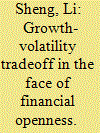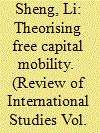| Srl | Item |
| 1 |
ID:
117864


|
|
|
|
|
| Publication |
2012.
|
| Summary/Abstract |
This article discusses a number of significant negative externalities generated by free capital flows and analyses certain justifications for regulating the capital account regime as an efficiency-enhancing tool used to limit externalities. This interventionist tool may limit the deviation of private equilibrium from social optimization by both improving the composition of capital flows and mitigating the accompanying distorted incentive that creates externalities. To avoid financial turbulence or economic crisis, countries (in particular, emerging economies) are urged to avoid the damaging influences of free-market ideology.
|
|
|
|
|
|
|
|
|
|
|
|
|
|
|
|
| 2 |
ID:
156754


|
|
|
|
|
| Summary/Abstract |
This paper takes a close look at the urban governance and political culture of Macao, the world largest casino city. Macao has experienced spectacular economic growth since gaming liberalisation in 2002 and China's Free Individual Travel scheme launched in 2003. However, the booming gaming sector has crowded out other sectors of Macao. It has not only made the city's economy mono-structured and consequently extremely vulnerable to external shocks and fluctuations but also induced serious social divisions and political controversies within the local community. By tracing the root cause of the ongoing dilemma and crisis in the mode of governance, the dynamic relationships between formal and informal institutions, consensus politics and the social group culture are intensively discussed in a historical context. In fact, the sustainable development of the former Portuguese colony has largely been hindered by its residents' passive attitudes toward political communication, non-transparent urban governance, the absence of a middle class and the dominance of pro-establishment social groups.
|
|
|
|
|
|
|
|
|
|
|
|
|
|
|
|
| 3 |
ID:
151320


|
|
|
|
|
| Summary/Abstract |
China has witnessed a continual drop in the labour income share of its gross domestic product (GDP) and a steep rise in income that has caused a savings glut and high investments. China’s shrinking domestic demand indicates that its output growth must increasingly rely on expanded manufacturing exports to the US. China’s state accommodation for US offshoring further aggravates trade imbalances between the two countries. The United States is also experiencing a rise in social inequality associated with a decline in savings that is a fundamental cause of its current-account deficit with China. The swelling US service sector interacts with a high ratio of consumption to income, and the liberal US policy for cost outsourcing to China has a complicated impact on employment and an adverse effect on inequality.
|
|
|
|
|
|
|
|
|
|
|
|
|
|
|
|
| 4 |
ID:
101340


|
|
|
|
|
| Publication |
2010.
|
| Summary/Abstract |
This paper analyses optimal tradeoffs between economic growth and economic volatility given the risk of open capital markets in developing countries due to their financial vulnerability to unfettered capital flows. It is argued that free policy choices are efficiently superior to free capital mobility and that a developing country can be open to higher growth and lower volatility only if its financial system is substantially strengthened.
|
|
|
|
|
|
|
|
|
|
|
|
|
|
|
|
| 5 |
ID:
108512


|
|
|
|
|
| Publication |
2011.
|
| Summary/Abstract |
Using a simple economic model, this article illustrates the greatly diverging interests and preferences of developed and developing countries with regards to capital mobility. Theoretically, developed countries' gain from free capital mobility likely comes at the expense of risk and loss for developing countries due to the latter's financial vulnerability. It is also found that it does not pay for a developed country to push its developing counterparts into prematurely liberalising their capital markets because this type of impatience reduces the developed country's own first-mover advantage in strategic bargaining for capital mobility benefits.
|
|
|
|
|
|
|
|
|
|
|
|
|
|
|
|